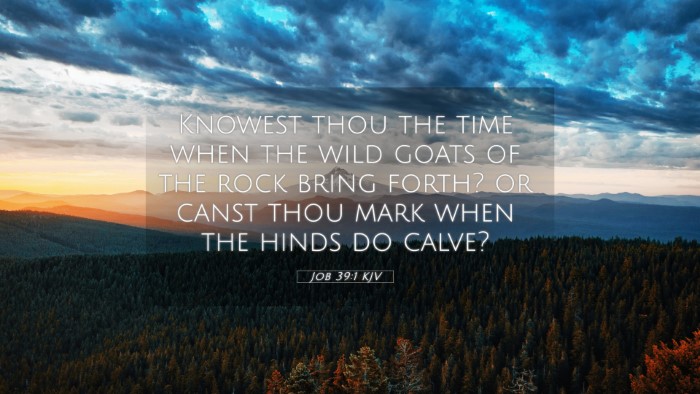Old Testament
Genesis Exodus Leviticus Numbers Deuteronomy Joshua Judges Ruth 1 Samuel 2 Samuel 1 Kings 2 Kings 1 Chronicles 2 Chronicles Ezra Nehemiah Esther Job Psalms Proverbs Ecclesiastes Song of Solomon Isaiah Jeremiah Lamentations Ezekiel Daniel Hosea Joel Amos Obadiah Jonah Micah Nahum Habakkuk Zephaniah Haggai Zechariah MalachiJob 39:1 Similar Verses
Job 39:1 Cross References
Knowest thou the time when the wild goats of the rock bring forth? or canst thou mark when the hinds do calve?
Uncover the Rich Themes and Topics of This Bible Verse
Listed below are the Bible themes associated with Job 39:1. We invite you to explore each theme to gain deeper insights into the Scriptures.
Job 39:1 Cross Reference Verses
This section features a detailed cross-reference designed to enrich your understanding of the Scriptures. Below, you will find carefully selected verses that echo the themes and teachings related to Job 39:1 KJV. Click on any image to explore detailed analyses of related Bible verses and uncover deeper theological insights.
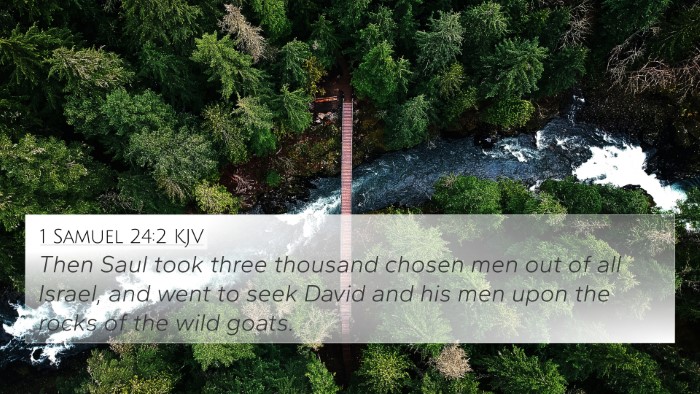
1 Samuel 24:2 (KJV) »
Then Saul took three thousand chosen men out of all Israel, and went to seek David and his men upon the rocks of the wild goats.
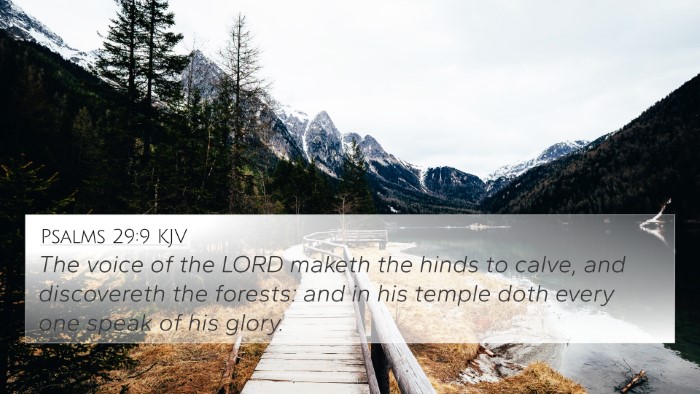
Psalms 29:9 (KJV) »
The voice of the LORD maketh the hinds to calve, and discovereth the forests: and in his temple doth every one speak of his glory.
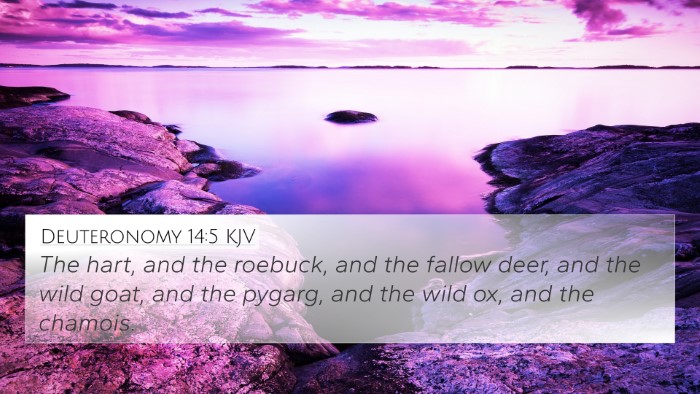
Deuteronomy 14:5 (KJV) »
The hart, and the roebuck, and the fallow deer, and the wild goat, and the pygarg, and the wild ox, and the chamois.
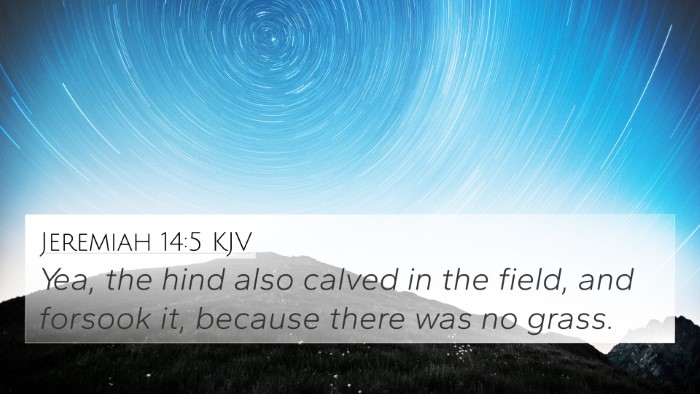
Jeremiah 14:5 (KJV) »
Yea, the hind also calved in the field, and forsook it, because there was no grass.
Job 39:1 Verse Analysis and Similar Verses
Understanding Job 39:1
Job 39:1 states: "Do you know when the mountain goats give birth? Do you observe the calving of the deer?" This verse poses a rhetorical question to Job, highlighting God's intimate knowledge of his creation.
Commentary Insights
This verse serves as part of God's response to Job, demonstrating His sovereignty and unparalleled understanding of the natural world. Various public domain commentaries provide deep insights into its meaning:
-
Matthew Henry:
Henry emphasizes God's omniscience and His active role in creation, suggesting that the question is meant to illustrate how little Job can comprehend the ways of God. It invites humility in the face of divine majesty.
-
Albert Barnes:
Barnes notes that the mountain goat symbolizes strength and wildness. The inquiry about their birthing process serves as a reminder of God's control over even the most untamed aspects of nature, encouraging believers to trust in God's providence.
-
Adam Clarke:
Clarke highlights the specificity of God's questions, indicating that each animal's birthing process is beyond human observation. This serves to reinforce the theme that God's knowledge surpasses human understanding, a central motif in the Book of Job.
Thematic Connections
Job 39:1 connects with several biblical themes, prompting reflections on creation, divine control, and human limitation. Here are some Bible verse cross-references and connections:
- Psalms 104:24-25: "O Lord, how manifold are your works! In wisdom have you made them all; the earth is full of your creatures." This reflects the theme of God's intricate and wise creation.
- Isaiah 40:12: "Who has measured the waters in the hollow of his hand and marked off the heavens with a span?" This verse emphasizes God's vast knowledge and power over creation.
- Proverbs 30:24-28: "Four things on earth are small, but they are exceedingly wise." This passage recounts the wisdom inherent in creation, affirming God's design.
- Job 38:39-41: This preceding passage mirrors Job 39:1 by showcasing God's care and provision for wild animals, asking, "Can you hunt the prey for the lion?"
- Ecclesiastes 3:19: "For what happens to the children of man and what happens to the beasts is the same." This verse links humanity and creation, raising questions about divine justice and understanding.
- Matthew 6:26: "Look at the birds of the air: they neither sow nor reap nor gather into barns, and yet your heavenly Father feeds them." This connects to God's providential care over all living things.
- Isaiah 55:8-9: "For my thoughts are not your thoughts, neither are your ways my ways, declares the Lord." This verse reaffirms the distinction between divine and human understanding, aligning with the themes in Job 39:1.
Cross-Referencing Biblical Texts
When engaging in cross-referencing Bible study, Job 39:1 serves as a pivotal point to explore how the themes of creation and divine knowledge are interwoven throughout Scripture. Here are several tools for Bible cross-referencing to consider:
- Bible Concordance: Use a concordance to locate related verses and themes, especially those involving God's creation and sovereignty.
- Bible Cross-Reference Guide: This can aid in identifying connections between themes across both the Old and New Testaments.
- Bible Reference Resources: Engage resources that detail thematic studies and connections, particularly focusing on creation narratives.
- Cross-Reference Bible Study: Group verses thematically to see parallels in God's relationship with creation in various contexts.
- Bible Chain References: Create chains of related verses to visually represent how interconnected Scripture can be, emphasizing divine knowledge.
Practical Applications
The insights derived from Job 39:1 can be applied in various ways:
- Trust in God's Wisdom: As believers, we are reminded that God's understanding far exceeds our own, encouraging faith amidst uncertainty.
- Humility in Our Approach: Recognizing our limitations fosters a humble attitude in our spiritual journey, urging us to seek God's guidance.
- Stewardship of Creation: Understanding God's care for His creatures motivates a responsible attitude towards the environment and wildlife.
- Encouragement in Prayer: Knowing that God intimately understands all aspects of creation assures us that our concerns and requests are heard.
Conclusion
Job 39:1 ultimately reveals the profound truth that God's knowledge of His creation is both vast and intricate. This text encourages believers to contemplate the divine majesty and order within the natural world, fostering a deeper appreciation for God's ways and a greater trust in His providence. Engaging with Bible verse parallels and understanding thematic Bible verse connections allow for a richer comprehension of biblical teachings, ultimately deepening our faith.

